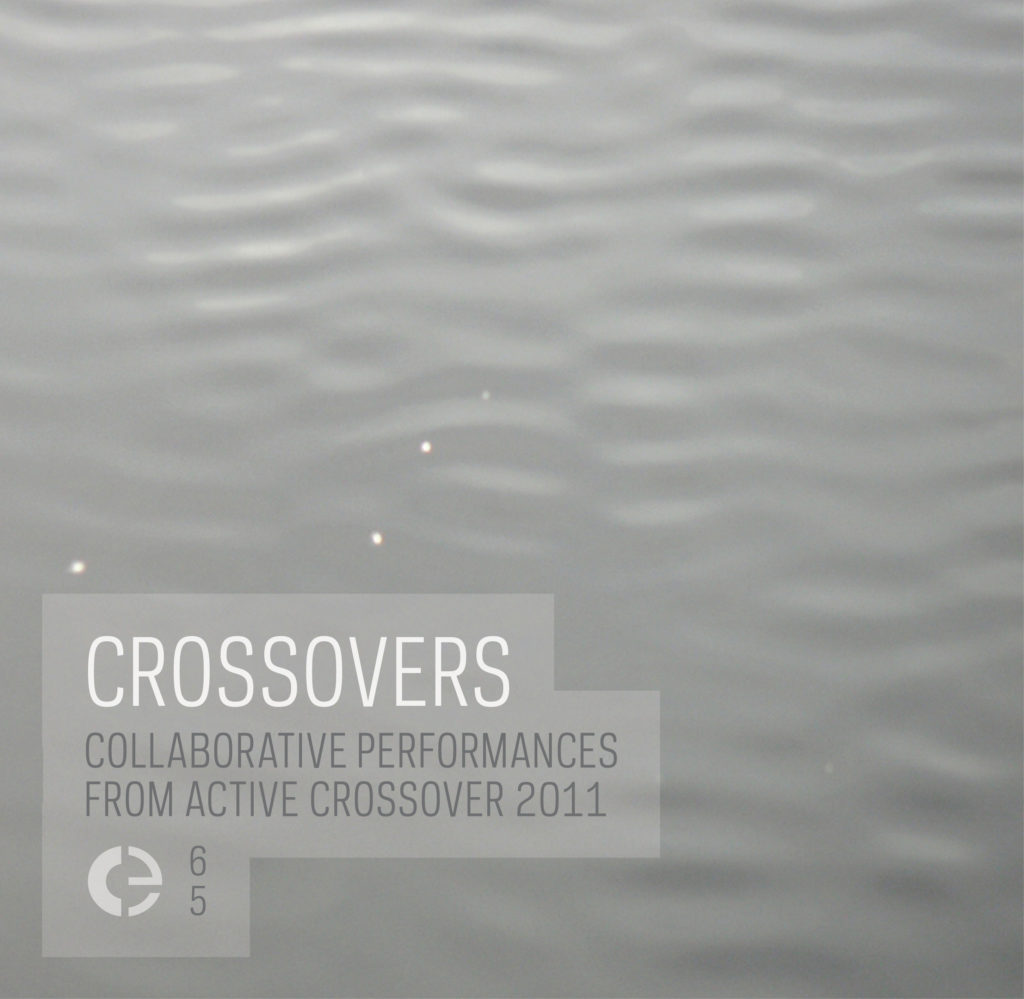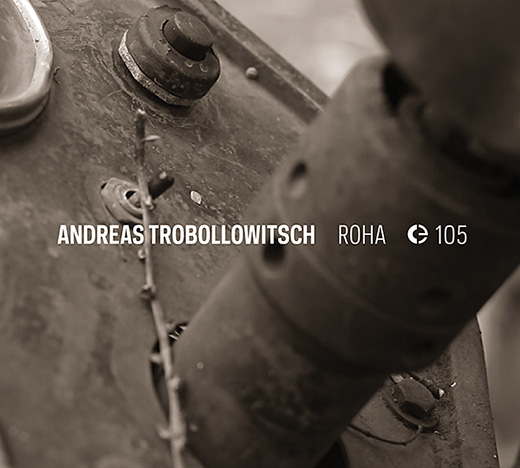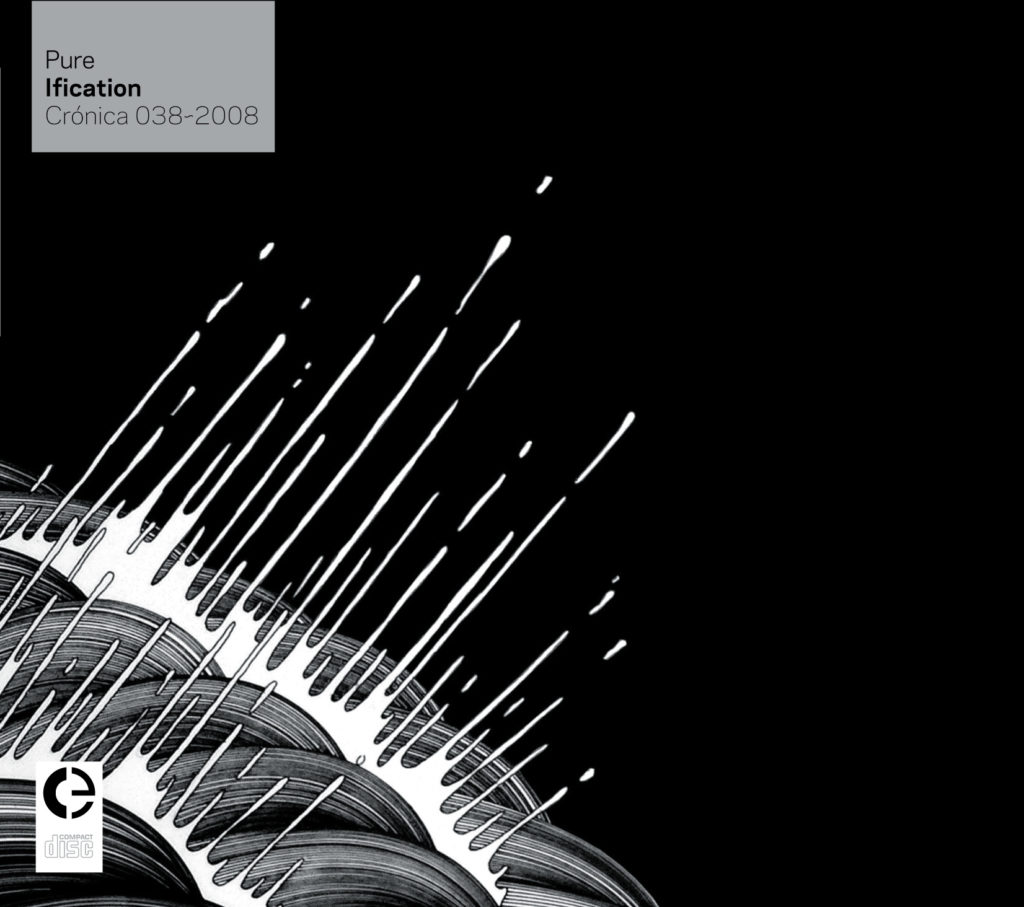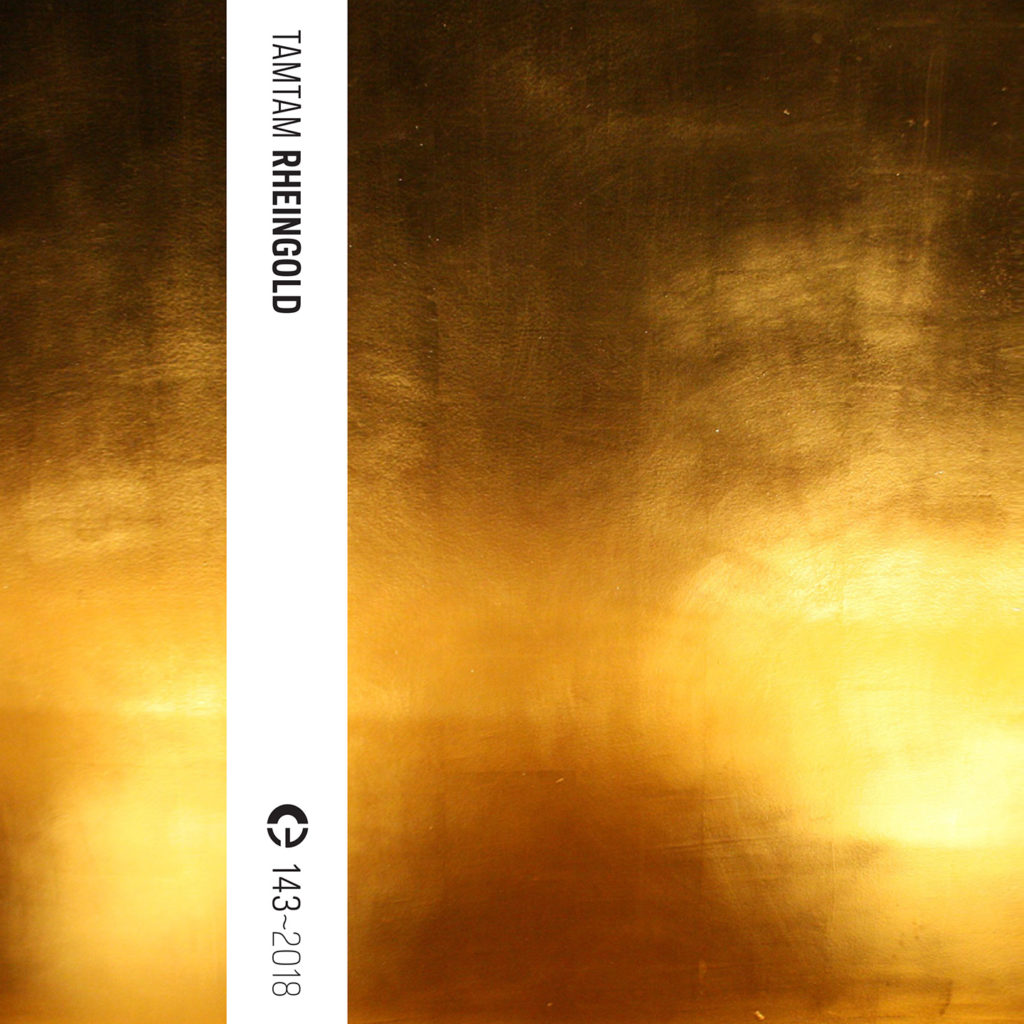
Hello, I’m back once again and today I’ve got another great release on the Portugese label CRÓNICA for you. The 2012 Various Artists compilation CROSSOVERS which compiles a big selection of collaborative performances from events organized by British sound artist Simon Whetham as part of his project Active Crossovers. The compilation download is in 16-bit/44.1kHz CD quality and features the cover artwork in good resolution as well as a PDF file with the full tracklist, release description and credits. This a pay-what-you-want release on the Bandcamp page, you can enter 0 to get it for free but it’s also good to support the artists and the label by paying for it, as a donation for their good efforts, like I did.
CROSSOVERS is a compilation album of various sonic approaches and styles, but what is definitely clear about the general sound of this compilation is that the music and sound art often has a rather Ambient sound to it. While not all 23 pieces on the compilation are relaxed and meditative, many pieces carry a kind of peaceful atmosphere with them, even with the free improv spirit lingering in many pieces the music is rarely harsh or abrasive in a Noise direction. With its total length of 3 hours and 4 minutes the compilation does demand quite a lot of patience from the listeners, however I found this compilation to be quite the smooth listening experience and while there are a few pieces on here that I didn’t find as interesting (and left my attention wandering off a bit) the music in general is varied, creative and captivating. In many ways the compilation takes listeners on a journey that crosses the perception of sound and music but can also be a good accessible guide to listeners (like me) who’ve only about just started digging into the Sound Art releases out there and showcases the many immersive ways these artists use, shape and manipulate sound. So what was the approach of organizing the collaborations on this compilation? Well, as Simon Whetham points out in the PDF file, all artists collaborate with artists they’ve never collaborated with before, in pairs. Besides this, Simon also asked the participating artists to follow a kind of structure in the performance which enables both collaborators to move from solo 1 (first performer) to collaboration to solo 2 (second performer) and in my opinion has also given the pieces a kind of good base with which the perfomances sound more like polished finished pieces than freely improvised pieces that may or may not work. While complete freedom can indeed cause amazing music in improvised music, the few rules for the collabs on this compilation definitely shaped the sound in a positive coherent way that also never blocks the freedom at the same time.
CROSSOVERS starts with a collaboration between Andi Chapple and Dominic Lash on track 1, it’s a decent piece and there’s an interesting interplay between delayed “clapping†watery percussion rhythms and violin improvisation, not one of my favourites however. So, we’ll move to track 2 on which Simon Whetham (who appears on many of these collabs himself) collaborates with Nurse With Wound member Colin Potter, it’s a great mixture of mysterious distorted Drones fading in and out an ambience of what sounds like “metallic†birds. It sounds a bit like the soundtrack of an alien landscape made of both metal and organic materials that hides its own secrets. On track 3 Simon is collaborating with Jonathan Coleclough, a pretty lowercase piece full of subtle vinyl crackling, clicks and small metallic sounds spread over the stereo field that feels like a peaceful massage of the ears by a sonic abstract painting of small objects. On track 4 Felicity Ford and Mark Durgan create a nice trippy piece of (lo-fi) music infused with hiss that sounds similar to 60’s psychedelic synth experiments, a lot of quirky liquid sounds combined with sharp “electric†impulses by Felicity Ford. Felicity Ford is active nowadays with her ongoing project Knitsonik in which she combines her knitting art pieces with sound art. Which is definitely audible in the needle impulses in the collaboration. Martin Franklin and Cheapmachines created a cloud of sound that sounds like earth in its texture mixed with electricity and industrial machine sounds. A slightly rough yet also calm piece that flows as a drone yet also progresses in the changing crackling, whirrs and other artifacts moving around. On Track 6 Rebecca Joy Sharp and Philip Jeck combine Rebeca’s harp performance and Philip’s warm sonic resonant clouds of sound into a piece that feels both Classical but like a Contemporary Classical composition in alternate universe filled with soft hisses, bells, resonances that embrace the harp in a warm hug of sonic particle dust. On track 7 Simon Whetham and Antony Hall collaborate on one of my favourite tracks from this compilation. It’s a piece full of feedback, hisses as well as naturally occuring “Noiseâ€, what I liked the most about this piece however tho is the way it slowly progresses into what sounds like a storm happening. The last part with all the wooden hinges sounds also feels like a wooden house moving and being affected by the heavy wind of the storm. Track 8, the collaboration piece between Rodrigo Constanzo and Mark Pilkington is a funny piece, what starts as a calm electro-acoustic piece featuring live glitching of musical phrases moves to a pretty hilarious part of free jammming with drums and quirky synth sounds that sounds plesantly silly but also not annoyingly random. Playful and fun. Anton Hunter and Igor Hax’s collaboration on track 9 is another favourite of mine. The snowstorm piece as I would call it, it’s full with mysterious wind sounds as well as acoustic percussive texture that flows unpredictably like a snowstorm yet also gradually, in a captivating cinematic piece of music. Simon Whetham and Richard Ormrod’s collab on track 10 is pretty enjoyable but the free acoustic improvisation in the piece didn’t quite work as well for me as in other pieces, so I didn’t like this one that much. On track 11 however Simon Whetham and Rhodri Davies deliver a sweet sonic picture filled with crumbling rocks and glassy harp resonances, abstract but also exciting in its progression. Markus Jones and Ollie Dover’s collab on track 12 is again not bad, but not my favourite kind of free improv style. Track 13 with Ben Gwilliam and Phil Harding is also again, not my favourite, with the high frequency sinewave manipulation masking the details of the music more rather than enhancing it, in my opinion. Track 14 however is a sweet piece of music with Simon Whetham and Iris Garrelfs in which Iris’s vocal manipulations are particularly unique and interesting, combined with rustles and long resonant drones. Fascinating piece. The collaboration between Lee Gamble and Scanner on track 15 is probably one of the more obvious ones on this compilation, but the piece is definitely captivating and seemless in its sound, warm distorted hissy drones combined with glitches and quirky electronic effects. It’s also the only piece on the album that has a steady beat going at some point. Solid good piece. Both track 16 and 17 are pretty soft pieces of lowercase aural experimentation and while pleasant didn’t work for me unfortunately. The collaboration between Simon Whetham and Bela Emerson on track 18 sounds like an electro-acoustic boiling pot of sound, it’s very enjoyable in its mixture of liquid, metallic, resonating sounds that keep changing like some magic potion of textures. Duncan Harrison and Paul Khimasia Morgan bring a nice piece on track 19, highlight of this piece is the high frequency glitch+sine pattern that sounds like a scanner device, scanning data or other equipment that makes soft sounds while working. It gives a kind of safe feeling in the atmosphere of this piece which is often pretty sparse in its sound but features some unexpected bursts of sounds as well as deep underlying vibe of mystery. Track 20 with Alexander Wendt and Slow Listener features interestingly resonating harmonics as well as field recordings of a supermarket and also a distant police siren, nice touches to a good piece. Simon Whetham and Skjølbrot’s collaboration on track 21 is a sweet glitchy Ambient piece. On track 22 Ekoplekz and Bugbrand bring some proper modular analog spaciness, Bugbrand is nowadays a developer of analog synth modules so in this case it’s definitely a collab in more than the music itself alone. Proper synth Noise weirdness over 16+ minutes that is rather stretched out but very enjoyable and intense to listen to, awesomely psychedelic. The last track, by Kathy Hinde and SJ Esau is also very nice, Kathy’s nature-inspired percussive acoustic “system†slowly flows itself towards the rhythm of the song that SJ Esau forms with it, which very bright and pleasant. Great ending track of this compilation.
CROSSOVERS is a rather enjoyable and thrilling ride of a compilation that often surprises, inspires and immerses in the wide variety of sonics these artists all conjur up together. While I didn’t like all the pieces, I really do appreciate all the effort put in by all artists to give us all these unique collaborations. A good recommended listen for everyone interested in getting into a proper morning, afternoon, evening long listen of the rich sonic landscape of experimental music and Sound Art.
via Fluid Sonic Fluctuations










